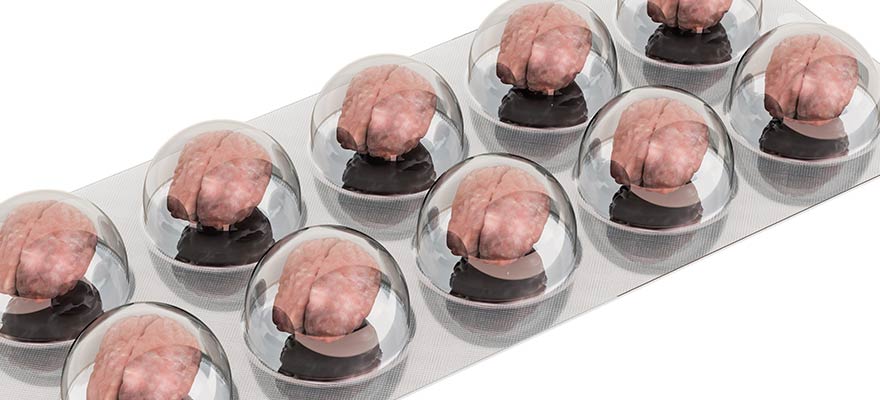Lecanemab: U.S. FDA grants fast-track approval
New Alzheimer’s drug hailed as breakthrough, but side effects are striking
The hype is great, but expectations are nonetheless muted: in early January 2023, the U.S. Food and Drug Administration (FDA) granted fast-track approval for the antibody lecanemab. The active ingredient for the treatment of Alzheimer’s dementia will now be launched in North America under the trade name “Leqembi”.
Before we inform you about this in detail, here are the facts first:.
- Lecanemab (trade name: Leqembi) is currently approved only for the U.S. market, and only recently.
- The “fast-track” approval leaves much to be desired, and manufacturers need to “follow up” with further studies.
- Only those affected in the early stages of the disease may receive the drug.
- Efficacy is reported to be only about 27%, although it is unclear what is getting better and whether this efficacy/improvement is significant in everyday life or can even be perceived by patients and relatives.
- Substantial side effects, some of which are life-threatening, are evident.
- It remains unclear who must bear the considerable costs.
- Lecanemab is currently not approved in Europe.
Millions affected by Alzheimer’s dementia have been waiting hopefully for many years for a drug that can stop the progressive disease. Accordingly, the euphoria and at the same time the hopes were high when already at the end of 2022, a compound called Lecanemab could show slight improvements in incipient and mild Alzheimer’s dementia in clinical trials, depending on the reading. The research-based pharmaceutical companies behind Lecanemab now received approval for the drug in the USA from the U.S. Food and Drug Administration (FDA) in a fast-track procedure on January 6, 2023.
The international response has been correspondingly strong. There has been talk of a “breakthrough,” a “milestone” and a “turning point. However, it is necessary to take a closer look at the new “wonder drug” with regard to the study of its development and, in particular, the side effect profile. Last but not least, the cost factor and the associated financial burden on those affected and your environment requires a statement from our editorial network. Only in such a way an unadulterated picture of the new medicine can be drawn.
Reason enough thus that also we throw an objective view of Lecanemab and its background, in order to classify the facts. First of all, we and all those doctors who work with Transcranial Pulse Stimulation would welcome an effective drug just as much as anyone else. After all, TPS is a form of therapy that is used in addition to medication. But one can welcome a medicine in good conscience and without reservation only if it is halfway so safe and so side effect-free for the patient as for example the Transcranial Pulse Stimulation.
What is lecanemab anyway?
Lecanemab is a humanized monoclonal antibody. Antibodies are proteins from the globulin class that are produced as a protective response by the immune system against the invasion of certain substances (known as antigens). In the case of Lecanemab, the humanized version was developed from a mouse antibody called “mAB158”. The active ingredient is said to be able to lead to passive immunization in affected individuals, as it is able to recognize protofibrils and prevent deposits of beta-amyloids on the nerve cells – at least this is what was initially shown in animal experiments on mice. These deposits lead to Alzheimer’s disease according to the “amyloid hypothesis,” which is now once again controversial. A thesis that is currently more than controversial among scientists.
The study on the new drug and its results:
The active ingredient lecanemab had been investigated in clinical trials involving several hundred participants over the past 10 years. Last November, a Phase III study involving 1,795 participants concluded that the drug could slow the progression of Alzheimer’s disease. Phase III studies are clinical trials in which a drug is tested on a large group of patients under medical supervision to find out whether its efficacy and also – which is of decisive importance for those affected – its safety (!) can be demonstrated in many different patients.
Half of the participants in the study, all of whom had incipient and mild Alzheimer’s dementia, received a dose of lecanemab of 10 milligrams per body weight at two-week intervals over an 18-month period. The other half received a placebo, i.e. a drug-free infusion. Among other things, the severity of the cognitive and functional impairments and the beta-amyloid level in the brain were recorded during the study.
According to the research companies, which had the active substance investigated, the result showed a moderate delay in the course of the disease of 27 percent in the verum group (i.e. those patients who actually received the active substance) compared with the placebo group. This is statistically significant, i.e. striking enough not to be considered a coincidence. However, it is not yet clear, the Lecanemab researchers admit, to what extent and to what extent the patients really notice the difference in everyday life. This is a fact that needs to be kept in mind, since the way patients cope with everyday life plays a decisive role in the disease. It also remains unclear how long the effect lasts.
Open discussion: how many side effects are acceptable?
But lecanemab, as mentioned, tested only in incipient Alzheimer’s dementia, also has strikingly many and also significant side effects. For example, brain swelling occurred in 12.5 percent of subjects, and 17 percent developed cerebral hemorrhages, which can be life-threatening.
According to the research companies, there were no deaths in the study. However, at the end of December 2022, an article appeared in the scientific journal “Science”, according to which three deaths may have occurred in connection with the therapy. This article criticized the fact that these cases had not been communicated and that this was a gross omission with regard to the safety data that had to be reported. Other renowned journals, including the New England Journal of Medicine, also initially called for further studies to better determine the efficacy and safety of lecanemab in early Alzheimer’s disease. That the manufacturers could obtain approval for lecanemab in an emergency U.S. trial was viewed with more skepticism.
Expedited approval: meeting “an unmet need”
But last Friday, a surprising decision was made: The Food and Drug Administration (“FDA”) granted “accelerated approval” (“AP”) for lecanemab. This form of approval allows the drug to be used in diseases for which there is an “unmet need” for treatment while more extensive studies continue to be conducted.
Lecanemab in the Media: “Hope for Millions” – “New Alzheimer’s Drug Comes to Market”
This FDA decision is – rightly – headline worthy. Around the globe, the announcement is making headlines, although reports today are usually quite more restrained than they were a few months ago, when the initial study results had been presented in parts without the details that are now known. The media reaction is thus great, but is becoming increasingly restrained:
“U.S. drug agency grants approval for Alzheimer’s drug – Treatment with the antibody Lecanemab is intended to slow the progression of early-stage Alzheimer’s disease. In test series it came however to side effects,” writes for instance the Frankfurter general newspaper (FAZ) in addition. The ARD’s TAGESSCHAU also reported with the headline “Severe side effects possible – U.S. approval for new Alzheimer’s drug” and the SPIEGEL headlined “U.S. drug agency grants approval for Alzheimer’s drug – In series of tests, brain swelling and bleeding occurred in the brain, nevertheless the FDA has granted accelerated approval for an antibody drug.”
Significant financial burden: lecanemab costs about $26,500 – per year
Lecanemab is now being marketed in the United States under the trade name “LEQEMBI.” The cost of therapy with Leqembi is expected to be approximately $26,500 per year. It is not yet clear whether patients will have to bear these costs themselves or whether American health insurers will pay for the treatment.
Either way – the HANDELSBLATT writes: “Regardless of this, analysts see great potential in the product in view of the enormous need for therapy in Alzheimer’s disease. The British analysis firm Evaluate Pharma, which aggregates market data and analysts’ estimates, sees the drug as potentially the top-selling new product launch of the current year. Annual sales could rise to $3 billion by 2028 thereafter.”
Application for European approval: what are the chances?
Following the FDA’s positive decision, the makers of Leqembi have announced that they will also apply for approval in Europe before the end of the first quarter of 2023. Whether, how, and how quickly the EMA (European Medicines Agency) will decide remains to be seen. In the case of another antibody called aducanumab (trade name: Aduhelm), which had been approved in the U.S. under extremely contradictory circumstances and then soon disappeared from the market, the EMA had issued a negative ruling. Aduhelm never reached European patients.
There will probably still be intense debates at the scientific and political level about the risk-benefit ratio of Lecanemab (Leqembi). Should the EMA give the “green light,” only patients with mild or incipient Alzheimer’s dementia would be eligible for treatment with the compound, in whom numerous risk factors would have to be ruled out beforehand and who would have to undergo intensive adjunctive diagnostics.
Outlook:
Research is generally progressing – and that’s a good thing.
We will know more in the coming months, and certainly more unanswered questions will be up for discussion and/or clarification in the U.S. in the meantime. Hundreds more substances are currently the subject of research, and new therapeutic options are needed more urgently than ever. In the near future, however, it will probably be mainly combination therapies that can best help those affected.
The organization “Alzheimer Switzerland” writes: “Non-drug interventions remain important – Moreover, if lecanemab is approved, only people in the early stages of their Alzheimer’s disease will be able to benefit from it. Therefore, non-drug interventions remain key to stabilizing or improving the quality of life of people with dementia and their families.”
Sources (Scientific):
https://www.nejm.org/doi/full/10.1056/NEJMoa2212948?query=recirc_curatedRelated_article
https://www.science.org/content/article/scientists-tie-third-clinical-trial-death-experimental-alzheimer-s-drug
https://www.nature.com/articles/d41586-023-00030-3
Sources (German Media):
https://www.tagesschau.de/ausland/amerika/alzheimer-medikament-101.html
https://www.faz.net/aktuell/gesellschaft/gesundheit/usa-zulassung-fuer-medikament-gegen-alzheimer-18585300.html
https://www.handelsblatt.com/unternehmen/industrie/pharmaindustrie-fda-erteilt-neuem-alzheimer-medikament-vorlaeufige-zulassung/28909750.html
https://www.welt.de/wissenschaft/article243078501/Leqembi-Neues-Medikament-koennte-Alzheimer-Verlauf-verlangsamen.html
https://www.spiegel.de/wissenschaft/us-arzneibehoerde-vergibt-zulassung-fuer-alzheimer-medikament-a-ece261d4-9c24-413b-9581-cdd0a14f45c2


